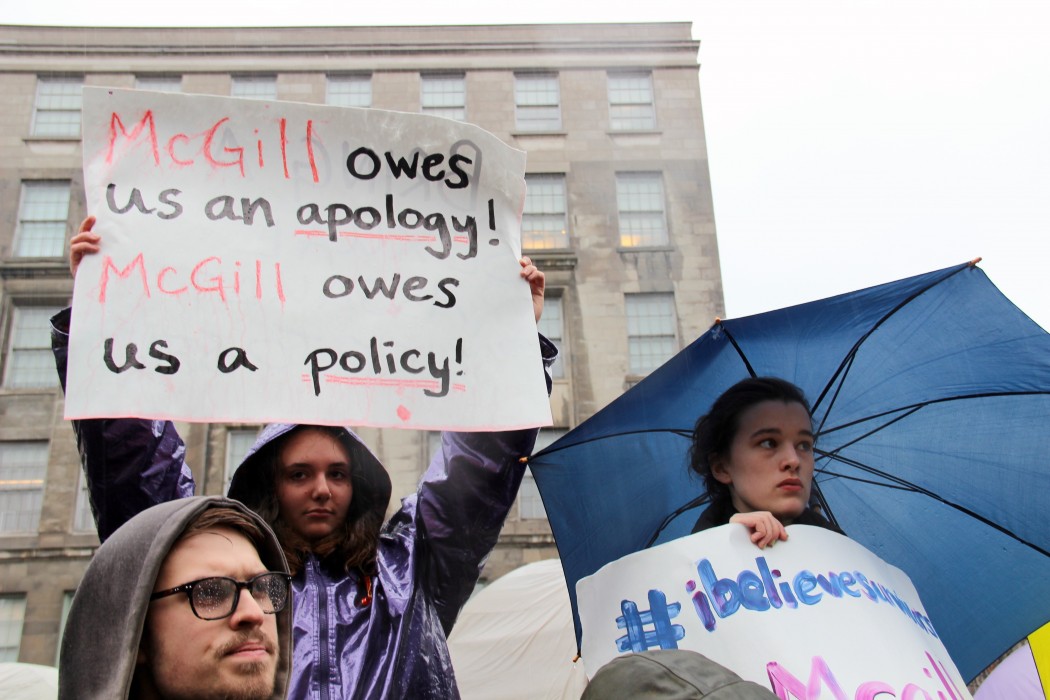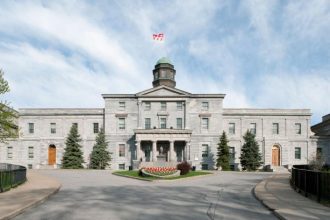On Thursday, March 31st, 2016, one week after Jian Ghomeshi was found not guilty of sexually assaulting three women, students gathered in the James Administration square to show solidarity for survivors. Despite the rain, around sixty people huddled together with signs — “McGill owes us an apology! McGill owes us a policy!”– and umbrellas.
At 2:40 pm, representatives from The Sexual Assault Centre of the McGill Students’ Society (SACOMSS) greeted the crowd, opening the floor to speakers from the Native Women’s Shelter of Montreal (NWSM), the Sexual Assault Policy Working Group at McGill (SAPP), Asian Women for Equality, and the Centre for Gender Advocacy.
Frustration was a common thread throughout the speeches. “We shouldn’t need a public scandal for change,” said Nakuset, the director of the Native Women’s Shelter. “We don’t want change that comes from harm”. Before the next speech, Divest McGill generously set up a tent to shield speakers from the ongoing rain.
Although speakers focused on expressing solidarity with the survivors from the Ghomeshi trial, many also referenced McGill’s failures in regards to sexual assault. The charges brought against three McGill Redmen in 2013, and the continued inefficiency of McGill’s sexual assault policy, were cited throughout.
Sarah M. Mah from Asian Women for Equality expressed anger, but not surprise, in regards to the Ghomeshi trial verdict, which she called “gross dismissal”. “Those courts were never designed for us,” she stated. However, she concluded on a more positive note. “Us coming together on a Thursday afternoon to voice our dissent, […] women organizing, is what it takes to make social change,” Mah affirmed.
Sexual Assault Awareness Week
The demonstration, which was led by volunteers from SACOMSS, was part of a larger Sexual Assault Awareness Week on campus. Starting on March 29th, 2016, Sexual Assault Awareness Week involves a total of eight events, and ends with a “Fire with Water” art show at the Mainline Theatre tonight, Monday, April 4th, 2016. The week’s activities aim to foster awareness and education regarding sexual violence.
Most of the events are workshops, including “How to Respond to and Support Disclosures,” “Healing: In Rhyme, in Time,” “Strong Black Women: On Race and Consent,” “Consent & Disability,” and “Physical Intimacy as a Survivor of Sexual Assault”, all focused on educating smaller (and sometimes closed) groups of people.
A Look at SACOMSS
During the open library and info session on April 1st, 2016, SACOMSS shared its mission for curbing sexual assault within the McGill community. SACOMSS provides outreach services, accompanies survivors, hosts a 24-hour hotline, facilitates support groups, helps the McGill community navigate policy, and advocates for survivors.
To learn a little more about SACOMSS, I met with Jean Murray and Talia Gruber, who are special projects coordinators for the organization.
1. How long has SACOMSS been up and running? Who’s in charge, if the organization is run by volunteers (and are those volunteers all students)?
Talia: Over 20 years!
Jean: Close to 30 probably?
Talia: “Over 20” is what we usually tell people.
Jean: Technically, no one is in charge, we’re non-hierarchical.
Talia: We have a designated policy-implanting committee tasked with various administrative tasks.
Jean: Volunteers are largely students but not entirely.
2. What about Bianca Tetreault (Liaison Officer, and one of the facilitators at the first workshop)? She’s not a volunteer, is she?
Talia: Bianca is from the Office of the Dean of Students. […] a lot of pressure was put on the university to hire someone [after the McGill Sexual Assault Policy Proposal]. She’s a phenomenal ally, but she’s not affiliated with SACOMSS.
Jean: SACOMSS has no full time staff and nothing to do with McGill, but we are funded by student fees.
Talia: There’s a huge isolation between admin, students, and SACOMSS […] Bianca’s been really helpful in connecting everyone.
3. How active are you during the school year?
Talia: We run [DIAL] every day from 12pm to 12am, hold support groups throughout the year, do outreach to high schools, and provide accompaniment to survivors[…]
Jean: So we’re very active throughout the school year!
4. It goes without saying that Sexual Assault Awareness Week is an important initiative, but why do you think it’s important to talk about sexual assault?
Talia: Obviously, the recent Ghomeshi case showed us that the justice system is failing survivors. This is also coming after two years of a sexual assault policy being brought forward to McGill. [Sexual Assault Awareness Week] is designed to bring awareness, but also help people learn to [help] survivors. It’s well placed for community mobilization, and provides space for survivors to work through [recovery].
5. Could you explain the difference between open and closed workshops and why it’s important to have both?
Jean: An open workshop is open to anyone, a closed workshop is for people who have a specific identity. I think the importance of that is that there are certain folks of certain identities who are more disproportionately affected by sexual violence; we wanted to help create an intentional space for and by themselves. […] People’s voices get drowned out in open spaces. It’s important to know people have a shared identity, a shared experience.
Talia: It’s a good way for survivors to have agency in this process.
(Talia explained that survivors don’t have this in open spaces, and that there’s not always the right level of education for sensitive responses to their experiences when in public.)
Talia: It’s a dangerous space to put people in. It’s not about policing identity, we’re not like checking people.
Jean: Space is such a powerful tool….what we’re trying to do is give back the power to those who have had it taken away.
6. How do you reach people who need a basic level of education about sexual violence? Do you feel like you’re doing that effectively, and if not, how do you plan to address it?
Talia: I’ve heard that Rez Project is great. The problem is that people are coming into [their] first year with so many myths that’s it’s almost like getting people to unlearn all the harmful [things] they’ve been taught, instead of providing them with a basic level of education. People who care about these things are already more willing to come and get involved. But when you enter first year with all these rape culture myths, they’re hard to unlearn.
Jean: We need comprehensive consent education from a much earlier level.
Talia: A lot of us want to believe in the legal system, in our institution…it’s hard for people to hear that the system is failing people. You know, taking some eighteen year old and telling him that the law doesn’t work, that McGill is failing survivors, that’s tough.
Jean: [Change] involves a huge cultural shift that we’re not seeing yet.
7. What do you most urgently need people to understand?
After some tired laughter and frustrated pondering, they settled on a response: “believe survivors,” and, of course, consent.
8. What could the McGill community do to better support SACOMSS and survivors?
Jean: Better sexual assault policy,
Talia: Stop minimizing sexual assault as an issue, stop rolling your eyes at things like consent project. These things happen because of years and years of concerted effort.
Jean: In six years, I’ve seen very little change in this institution…I think I’d like for people to start realising that this affects people on a huge level and that change has to happen on a community level.
Talia: [Change] hasn’t been concrete enough, fast enough, or effective enough. In some ways our community is really wonderful. But in so many ways, we’re still failing.
Student Responses: McGill, Consent, and Where We Go From Here
After the demonstration, students filed into the SSMU ballroom to get out of the rain and eat some cake (provided by Midnight Kitchen). Surprised at the earlier turnout, I asked a few people why they had attended.
“I hope to communicate that sexual assault is something that happens to people, […] you should be able to feel comfortable coming forward […] and supporting others in the community,” replied Sarah Lefebvre, a U2 psychology student.
Katarina Kuhnert, a U1 Arts and Science student, added the following:
I think visibility is a big thing. There’s an idea that you should be ashamed if bad things happen to you,” she explained, also mentioning how damaging this assumption is for survivors. “But [Sexual Assault Awareness Week] is good for getting men involved, and getting people who haven’t experienced [assault] themselves to act as better allies. […] I think if the dominant voice is ignorant, grassroots organizations need to be louder”.
Another student expressed the desire to “communicate to survivors that there is a community at McGill that supports and believes them”. Sarah Graham, Arts faculty, also said that “the conversation needs to be changed [by] teaching people not to assault others”. Nike Fashola, Political Science, agreed: “It affects my life, […] I feel like people don’t acknowledge it as much as it should be [acknowledged], which creates an anti-survivor dialogue that is offensive and hurtful to many”.
Support, Administration, and the McGill Community
Do students not feel, then, that McGill itself supports and believes survivors? “No, and that’s possibly due to politics, [how McGill] wants to present [itself], but I feel like there’s a lot more they could do and choose not to, to keep their face,” Fashola replied. Graham agreed: “As much as there are efforts, I think there’s a lot more that can be done and I don’t think McGill is supporting survivors”.
Lefebvre made a distinction between the administration’s response and that of students: “I think the student community is [informed about consent], and SSMU works to make sure student organizations are educated. I think the administration doesn’t want to upset anyone or make it seem like they have any sort of opinion”.
“I think there are pockets of good support,” Kuhnert said, citing Queer McGill and SACOMSS, “[but] I don’t think McGill as an administration does enough in general”. An example of this, Kuhnert pointed out, is mental health services – arguably a necessity for supporting survivors. “All of these issues are interrelated”.
Later, Kuhnert also asked: “Why is everything left up to SSMU?” Jarecsni nodded in response to this, adding: “I agree it shouldn’t be only SSMU’s responsibility. In my faculty–” (Education) “–there should be a greater emphasis on educating children about consent. […] There is no mandatory course for that. People don’t have the education to change that, and [..] education perpetuates the current system”.
Safety on Campus
Since there was so much doubt regarding the efficacy of the administration, I asked if Jarecsni felt safe at McGill. “I think I feel safe only because nothing has ever happened to me,” she replied.
“It’s so prevalent, if it hasn’t happened to you, then it’s happened to someone you know,” Lefebvre added.
Graham echoed this sentiment as well: “there are so many people in silence, it’s just so unjust. […] With the school especially doing nothing… I know they’ve made some types of policies, but it’s not enough”.
Looking Back, Moving Forward
With the “Fire With Water” art show wrapping up tonight, Monday, April 4th, 2016, Sexual Assault Awareness Week is almost over. However, many will leave this week with new sources of information and important knowledge: “I did find [workshops] helpful, one thing that specifically sticks out for me is that it takes time for people to process [their experiences]. It was really validating to hear that,” Graham told me.
As many expressed over the course of the week, hopefully the education provided to students will be a start of bringing much-needed change on campus for policy and survivors alike.


